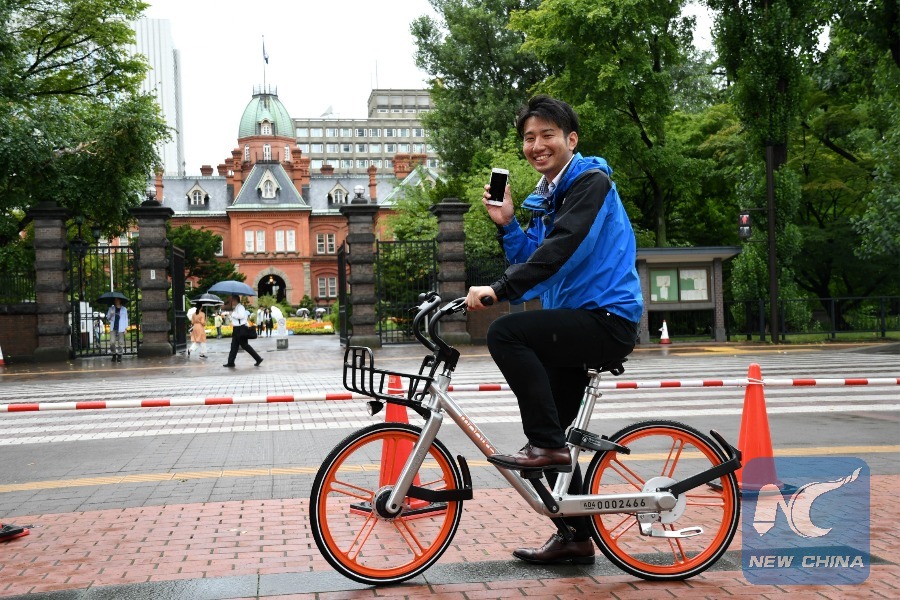
Softbank's humanoid robot "Pepper", co-established by Nestle Japan and Chinese digital payment company Ant Financial, works at a coffee shop in Tokyo, Japan, Feb. 8, 2018. (Xinhua/Qian Zheng)
by Xinhua writer Yan Lei, Jon Day
TOKYO, April 18 (Xinhua) -- Chinese State Councilor and Foreign Minister Wang Yi on Tuesday wrapped up a three-day official visit to Japan, during which he co-chaired the fourth high-level economic dialogue between China and Japan with Japanese Foreign Minister Taro Kono.
Wang's visit, as well as the dialogue which was held after an eight-year hiatus, are expected to further consolidate the warming-up trend in bilateral ties and open up new space for cooperation, experts said.
TIES' WARMING-UP ACCLAIMED
"The momentum of improvement in Japan-China bilateral ties has been gathering steam recently following a number of high-level talks, and we are really pleased to see that," said Kaoru Imori, a senior research fellow at a private university in Tokyo.
The latest of such high-level talks was between Wang and Kono, he added.
China-Japan relations have gone through some twists and turns in recent years, which have affected bilateral communication and cooperation in various areas.
Since last year, Japanese Prime Minister Shinzo Abe has sent positive messages on a number of occasions on enhancing bilateral relationship, which have been noted and welcomed by China.
Thanks to joint efforts, bilateral relationship has showed signs of recovery. Bilateral trade rallied to some 300 billion U.S. dollars in 2017, and the number of tourists going to Japan from Chinese mainland reached 7.3 million, up 15 percent year-on-year.
"The improvement in ties, marked by Wang's visit, is in the interests of both China and Japan who are close economic partners, and will also have a positive impact on the region's stability and prosperity," said Imori.
Jin Jianmin, a senior fellow at Fujitsu Research Institute in Tokyo, said that the improvement is particularly significant under the current circumstances with turbulence continuing and trade protectionism on the rise worldwide.
Dr. Shin Chiba, a professor specializing in political theory at International Christian University, said that "strengthening the current Japan-China bilateral ties is indeed good for both countries not only in terms of economic relationships but also other aspects, including political relations, for the present and the future."
Liu Di, a professor at Kyorin University in Tokyo, has a similar view,saying enhancing ties with China at such a time also has political significance for Japan.
"With destabilizing factors and uncertainties in the world, the Japanese government and the public have increasingly realized the importance of having a good relationship with China in order to adapt to the new circumstances," he said.

A man rides a Mobike in Sapporo, Japan, on Aug. 22, 2017. (Xinhua/Hua Yi)
NEW HISTORICAL OPPORTUNITIES
The warming of bilateral ties will also open up a new scope for bilateral and multilateral cooperation, especially with China's plans to expand reform and opening up and its Belt and Road Initiative, experts pointed out.
Chinese President Xi Jinping announced new measures for expanding China's reform and opening-up at the 2018 annual conference of Boao Forum for Asia, which will surely provide new opportunities for cooperation between China and Japan, experts noted.
Meanwhile, the Japanese economic circle has also been stepping up calls for joining China's Belt and Road Initiative so as to share China's development fruits.
Jin said that China and Japan reaffirmed in the economic dialogue the importance of free trade under the multilateral framework of World Trade Organization (WTO), discussed issues about Belt and Road cooperation as well as efforts to promote regional free trade such as the building of China-Japan-South Korea Free Trade Area (FTA).
"As the United States, under U.S. President Donald Trump, is very unstable, I believe that China-Japan economic and political relationships will become all the more important," said Chiba.
"Such coordination in trade and investment liberalization policies between the two countries will help curb trade protectionism in the world while providing a stable and predictable policy environment for cooperation between enterprises," said Jin.
Besides traditional areas, Jin said that the two countries also pledged to expand cooperation in new economic areas, such as the sharing economy, medical and elderly care, which will bring bilateral economic cooperation to a higher level.
"The economic dialogue, covering not only bilateral economic ties, but also Asian economic integration and world free trade, will set a positive example for maintaining and developing global economic order," said Liu.

People visit the Japanese booth at the China-Northeast Asia Expo in Changchun, China, Sept. 1, 2017. (Xinhua/Zhang Nan)
FURTHER EFFORTS NEEDED
Experts also noted that current China-Japan ties are still disturbed by various complicated and sensitive factors, including historical and territorial issues.
During his visit, Wang called on the Japanese side to work with China to strictly abide by the principles established in the four important political documents between China and Japan.
The two sides should properly handle sensitive issues related to the political foundation of bilateral relations, and fully implement the consensus of treating each other as a cooperative partner, Wang said.
Hiroshi Onishi, a professor of economics at Keio University in Tokyo, noted that there are still some ultra-rightists in Japan. He called for more people-to-people and cultural exchanges to promote mutual trust and understanding.
It's a long-term and challenging task to overcome disturbances and interferences to improve bilateral relationship, and would need the joint efforts of the governments and people of both countries, Liu said.
Imori is optimistic about the future of China-Japan relationship. "Personally, I think this (recent improvement in ties) is the direction that Japan and China should always be heading in, even if there might be a few bumps in the roads ahead -- this also underscores the importance of always maintaining open and honest dialogue," he said.

